| WEEKLY BUZZ |
|
JANUARY 07 - 13, 2018 |
Day Two of Sahyadri Conclave – Science, Technology & Management
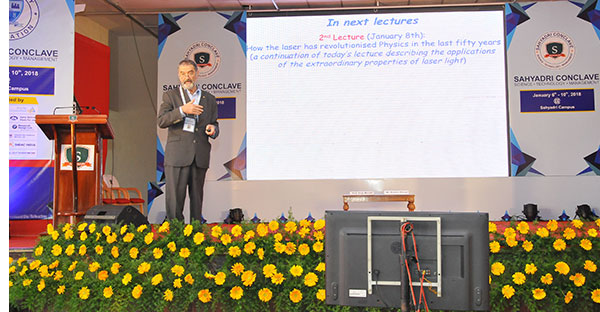 Day Two started with the plenary session of Prof. Serge Haroche, Nobel Laureate who delivered a technical talk on “Controlling and manipulating single photon in a box- The scientific adventure of lifetime”. He discussed stories of his scientific life. He said being a scientist was not a profession but his passion. Between the age of 9 and 12, he was fascinated by various astronomers. He had immense interest in the field of astronomy and was keen to learn more and discover the laws beholding the same. He also spoke about mutual relationship between atoms and light. He spoke about how classical physics could not solve the puzzle of spectrum of light being emitted from heated bodies and the concept of photoelectric effect. Day Two started with the plenary session of Prof. Serge Haroche, Nobel Laureate who delivered a technical talk on “Controlling and manipulating single photon in a box- The scientific adventure of lifetime”. He discussed stories of his scientific life. He said being a scientist was not a profession but his passion. Between the age of 9 and 12, he was fascinated by various astronomers. He had immense interest in the field of astronomy and was keen to learn more and discover the laws beholding the same. He also spoke about mutual relationship between atoms and light. He spoke about how classical physics could not solve the puzzle of spectrum of light being emitted from heated bodies and the concept of photoelectric effect.
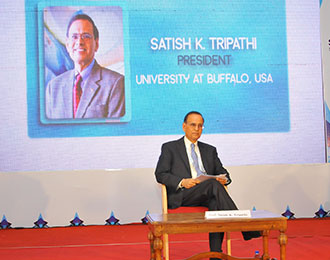 The second plenary session was facilitated by Prof. Satish K. Tripathi, President, University at Buffalo, USA. He spoke on “Change, Risk and Success – A Personal Story”. According to him there are three principles, an individual must inculcate: i) Set long term ambition and be ready for change, ii) Be self-reliant and always be ready to learn from others, iii) Plan strategically and carefully but always be ready to take risk. He was influenced by great faculty who instilled the idea of learning. He stressed on fundamental education and humanity. He emphasised on analytical and mathematical understanding of data using decision making.
The second plenary session was facilitated by Prof. Satish K. Tripathi, President, University at Buffalo, USA. He spoke on “Change, Risk and Success – A Personal Story”. According to him there are three principles, an individual must inculcate: i) Set long term ambition and be ready for change, ii) Be self-reliant and always be ready to learn from others, iii) Plan strategically and carefully but always be ready to take risk. He was influenced by great faculty who instilled the idea of learning. He stressed on fundamental education and humanity. He emphasised on analytical and mathematical understanding of data using decision making.
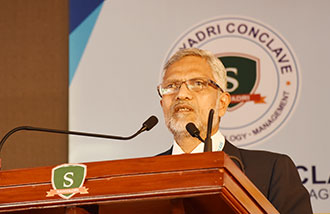 Plenary Session Three was facilitated by Vice Admiral N N Kumar, the Executive Director (Production) at BrahMos Aerospace Private Ltd. He delivered a talk on “BRAHMOS – A Journey of Excellence”. He spoke about India’s first launch vehicle SLV 3 and how successfully it was launched under the leadership of Dr. APJ Abdul Kalam. He also spoke about the five projects which were executed by The Missile Study team. He spoke about classification of Missiles, technologies established and Dr. APJ Abdul Kalam’s visionary idea-Seed for joint venture. He presented the various specifications used for deployment of BRAHMOS on SU-30. He concluded his talk by saying that “Weapons are not made to win the war, it is to avoid the war”.
Plenary Session Three was facilitated by Vice Admiral N N Kumar, the Executive Director (Production) at BrahMos Aerospace Private Ltd. He delivered a talk on “BRAHMOS – A Journey of Excellence”. He spoke about India’s first launch vehicle SLV 3 and how successfully it was launched under the leadership of Dr. APJ Abdul Kalam. He also spoke about the five projects which were executed by The Missile Study team. He spoke about classification of Missiles, technologies established and Dr. APJ Abdul Kalam’s visionary idea-Seed for joint venture. He presented the various specifications used for deployment of BRAHMOS on SU-30. He concluded his talk by saying that “Weapons are not made to win the war, it is to avoid the war”.
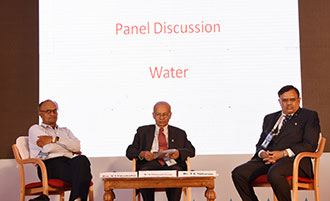 Panel Discussion was held on the theme “Water”. The panellists were Prof. T G Sitharam, Chairman of AICTE, South West Regional Office, Prof. M N Vidyashankar, IAS, Former Additional Chief Secretary & Dr. K Chidananda Gowda, Former Vice-Chancellor, Kuvempu University, Shimoga. The panellists stressed that for the sustainability of the planet water is essential. They said - access to clean water is a major challenge and according to the World Bank, every individual requires 135 litres per day to meet their basic requirements. They also discussed the reasons for water scarcity arising from increasing demand from domestic, agricultural and industrial sectors. The probable solutions for water scarcity lies with the inland reservoirs, interlinking of rivers, recharging the ground water, desalination of sea water, utilising flood water before it joins water and rain water harvesting.
Panel Discussion was held on the theme “Water”. The panellists were Prof. T G Sitharam, Chairman of AICTE, South West Regional Office, Prof. M N Vidyashankar, IAS, Former Additional Chief Secretary & Dr. K Chidananda Gowda, Former Vice-Chancellor, Kuvempu University, Shimoga. The panellists stressed that for the sustainability of the planet water is essential. They said - access to clean water is a major challenge and according to the World Bank, every individual requires 135 litres per day to meet their basic requirements. They also discussed the reasons for water scarcity arising from increasing demand from domestic, agricultural and industrial sectors. The probable solutions for water scarcity lies with the inland reservoirs, interlinking of rivers, recharging the ground water, desalination of sea water, utilising flood water before it joins water and rain water harvesting.
Simultaneously, there were technical sessions held in various venues of Sahyadri to address the domain specific participants like Computer Science & Information Science, Electronics & Communication, Mechanical and also Management.
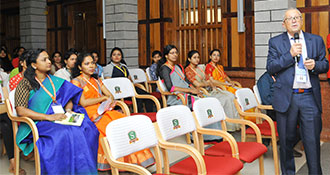 While addressing the Computer Science & Information Science participants, Prof. Joseph Sifakis, Turing Awardi discussed about “Information and Communication Technology (ICT) revolution and impact of Internet of Things (IoT)” in daily life, where he emphasized on construction of a IoT system along with the risk factors. He stressed on the key features about the Technological convergence, the vision and also on the scientific and technical challenges with respect to IoT. He mentioned that currently, IoT is used in many applications to communicate between electronic devices.
While addressing the Computer Science & Information Science participants, Prof. Joseph Sifakis, Turing Awardi discussed about “Information and Communication Technology (ICT) revolution and impact of Internet of Things (IoT)” in daily life, where he emphasized on construction of a IoT system along with the risk factors. He stressed on the key features about the Technological convergence, the vision and also on the scientific and technical challenges with respect to IoT. He mentioned that currently, IoT is used in many applications to communicate between electronic devices.
Prof. Sathish K Tripathi, President, University at Buffalo, USA spoke on “The New World of Thinking Machines”. He discussed about the evolution of Artificial intelligence, techniques and various responsibilities and goals of thinking machines. He also brought out the various uses of Artificial intelligence in daily life. He emphasised that Machine Learning & Deep Learning has proved to give excellent recognition rates for classifications.
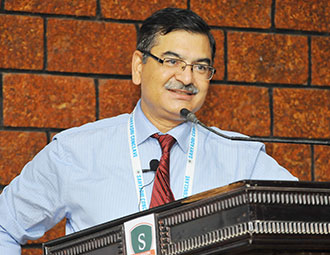 Mr. Amar Kumar Pandey facilitated a session on “Smart Cities”. He said urban centres like Corporation, Municipalities etc., are the reason for the Smart City mission. Retrofit is a plan where the old things or the existing systems are kept alive along with additional advancement in technology to ensure that common people live happily & healthily. Redevelopment effects can also be seen i.e., instead of retrofit if we need to change the geographic expansion of the existing cities, smart cities are going to be the best where technology is going to be a highlighting one.
Prof. Robert Richardson, Scientific Researcher in Robotics, Leeds University, UK spoke about “Exploration of Robotics”. Robots even used in the angle robot, visionary robots, Sense think act cycle robots are the visionary type one. Autonomous robots are the one they decide everything and act according to the situation by ignoring human. Robots in the different field of application are like confined space exploration, flexible camera robots, utility pipe inspection, and pipe climbing, restricted access motional type. Challenges in the field of robotics are complexity, miniaturisation, 3D integration, minimal assembly.
Mr. Amar Kumar Pandey facilitated a session on “Smart Cities”. He said urban centres like Corporation, Municipalities etc., are the reason for the Smart City mission. Retrofit is a plan where the old things or the existing systems are kept alive along with additional advancement in technology to ensure that common people live happily & healthily. Redevelopment effects can also be seen i.e., instead of retrofit if we need to change the geographic expansion of the existing cities, smart cities are going to be the best where technology is going to be a highlighting one.
Prof. Robert Richardson, Scientific Researcher in Robotics, Leeds University, UK spoke about “Exploration of Robotics”. Robots even used in the angle robot, visionary robots, Sense think act cycle robots are the visionary type one. Autonomous robots are the one they decide everything and act according to the situation by ignoring human. Robots in the different field of application are like confined space exploration, flexible camera robots, utility pipe inspection, and pipe climbing, restricted access motional type. Challenges in the field of robotics are complexity, miniaturisation, 3D integration, minimal assembly.
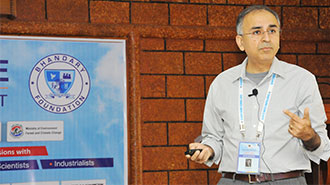 While addressing the Electronics & Communication participants, Dr. Anish Arora, Professor, Ohio University, USA spoke on “Social Sensing Services for Smart Communities”. He said that the requirement for protecting the endangered species is to detect the movement and to analyze whether it is animal or human. The next step is to send to base station and alert the guard. The sensors used in the forest are radar with 20k mah battery which lasts for 3 weeks. The sensor is placed in the bushes, these sensors are connected to relays and in turn it is connect to base station. The area where smart services can be used are smart street lights, common payment system , mobility assistance, pedestrian collision avoidance, multi model trips then traffic control.
While addressing the Electronics & Communication participants, Dr. Anish Arora, Professor, Ohio University, USA spoke on “Social Sensing Services for Smart Communities”. He said that the requirement for protecting the endangered species is to detect the movement and to analyze whether it is animal or human. The next step is to send to base station and alert the guard. The sensors used in the forest are radar with 20k mah battery which lasts for 3 weeks. The sensor is placed in the bushes, these sensors are connected to relays and in turn it is connect to base station. The area where smart services can be used are smart street lights, common payment system , mobility assistance, pedestrian collision avoidance, multi model trips then traffic control.
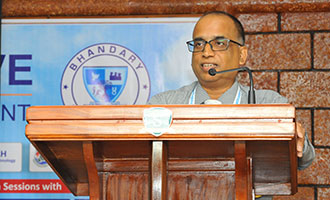 Dr. Kavi Mahesh, Director, Indian Institute of Information
Technology, Dharwad spoke on “Understanding Rainfall in India through Data Analytics”. He said that data is the arrangement of known symbols which we can understand and the arrangements must also be known. Data existed before computers. Computer never understood the data, human beings tried to understand data through computers after they got invented. Data can be always collected, analyzed and managed. Data is differentiated as structured, unstructured and semi structured. The data science is all about doing repeated experiments, getting the data, going through the data and finding a scientific solution. He concluded the session by stating the importance of data sciences - less investment, easy to implement and effective.
Dr. Kavi Mahesh, Director, Indian Institute of Information
Technology, Dharwad spoke on “Understanding Rainfall in India through Data Analytics”. He said that data is the arrangement of known symbols which we can understand and the arrangements must also be known. Data existed before computers. Computer never understood the data, human beings tried to understand data through computers after they got invented. Data can be always collected, analyzed and managed. Data is differentiated as structured, unstructured and semi structured. The data science is all about doing repeated experiments, getting the data, going through the data and finding a scientific solution. He concluded the session by stating the importance of data sciences - less investment, easy to implement and effective.
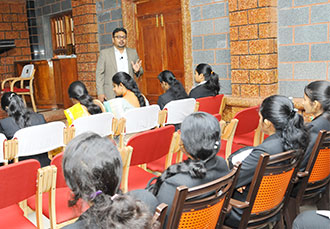 While addressing the Management participants, Mr. Sandeep S P, HR Lead for Engineering, Technology and SCM Centre Rolls Royce India, Bengaluru, in his first session on “Fortifying HR for future” mainly focused on the insights into trends in Business and its implications on HR. He beckoned the students to upskill their current knowledge in the area of HR and also work on their competencies as it defines their survival in the business. He said that business today is ever evolving and hence HR domain has become complex. Today, while taking any decisions one needs to take a global perspective, understand the Government policy and also the population dividend/leverage. He also went on to highlight the role of technology and business analytics in the HR Domain. In his second session on “Strategic HR business partnering - insights from a practitioner”, he apprised the audience on evolution and application of the three pillar model, effectiveness of the HR business partners, four roles of the HRBP’s and the critical roles played by HR. He also spoke on strategic workforce planning and its relevance in the dynamic business world.
While addressing the Management participants, Mr. Sandeep S P, HR Lead for Engineering, Technology and SCM Centre Rolls Royce India, Bengaluru, in his first session on “Fortifying HR for future” mainly focused on the insights into trends in Business and its implications on HR. He beckoned the students to upskill their current knowledge in the area of HR and also work on their competencies as it defines their survival in the business. He said that business today is ever evolving and hence HR domain has become complex. Today, while taking any decisions one needs to take a global perspective, understand the Government policy and also the population dividend/leverage. He also went on to highlight the role of technology and business analytics in the HR Domain. In his second session on “Strategic HR business partnering - insights from a practitioner”, he apprised the audience on evolution and application of the three pillar model, effectiveness of the HR business partners, four roles of the HRBP’s and the critical roles played by HR. He also spoke on strategic workforce planning and its relevance in the dynamic business world.
Afternoon Sessions of Day Two
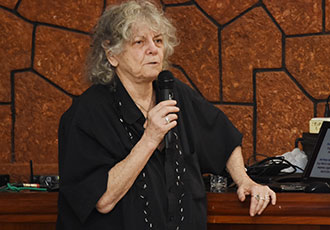
During the afternoon session of Day Two, Prof. Ada E Yonath, Nobel Laureate who was awarded the 2009 Nobel Prize for Chemistry spoke on the topic - “From Eco-problems to Eco- Friendly antibiotics”. She said that the ribosomes are universal. They function in a very similar way in all cells regardless of their source and hardly make mistakes. Most of the ribosomal antibiotics are extensions of small organic molecules that cannot be digested by eukaryotes and non-degradable in the environment. Therefore, they may penetrate into agricultural irrigation systems; enter human system and hence spreading antibiotic resistance.
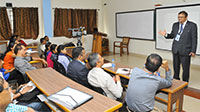
Dr. T. G. Sitharam, Chairman, AICTE, South West Regional Office spoke on “Sustainable Strategies for Water Resource Development using Rain Water”. He explained about replenishing ground water, river rejuvenation and coastal reservoir. He said that water storage is essential for irrigation, drinking water supply and hydropower to provide a buffer for flood management. He also spoke about the construction of an underground dam, India’s traditional water harvesting structures, coastal fresh water reservoir, various possible schemes for sea based/coastal reservoirs, Sea Based Reservoir Vs Land Based Reservoir, the Gulf of Khambhat Development project in Gujarat and advantages of coastal reservoir.
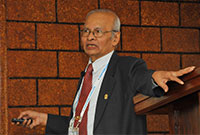 Dr. K. Chidananda Gowda, former Vice-Chancellor of Kuvempu University delivered a talk on “Disruptive Technologies”. Disruptive technology displaces an established technology and shakes up the industry or a ground. It involves breaking product that creates technology. It alters the way in which a business operates. “Innovator’s Dilemma” shares a brief explanation of disruptive technology. He highlighted that Clayton Christensen first introduced the concept of disruptive technology. Some of the common disruptive technologies are PC displaced typewriters; email replaced the way we used to communicate using letters. Smartphone’s replaced cell phones and PDA’s. We are currently in the Fourth Industrial Revolution. The First Industrial revolution used water and steam power to mechanize products. The Second Industrial revolution used electric power for mass production while the Third Industrial revolution evolved around digital revolution. The Fourth Industrial revolution involves fusion of technologies, blurring lines between physical, digital and biological spheres. It has been evolving exponentially rather than linearly. He emphasised that Clayton contrasted disruptive innovation with sustaining innovation which simply improves existing products. Mckinsey’s 12 disruptive technologies changing the world were discussed during the session.
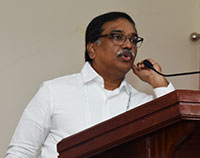
Mr. M V Subramanian, Co-Founder & Managing Director of Future Focus Infotech Pvt. Ltd. (FFI) and Mr. Sundaram Moorthy, the CEO of Caliper Engineering & Lab Pvt Ltd, Sahyadri Campus spoke on “Industry 4.0 with respect to Mechanical Engineering”. They spoke about Bot technology, enlightened students with information of coding, programming, importance of various engineering fields in today’s scenario i.e. interdisciplinary approach etc. Students were motivated to take programming as a hobby rather than syllabus, to have hands on experience rather than theoretical study. They also briefed about the several opportunities provided at Sahyadri to students and stimulated them to grab these opportunities with positive attitude. Finally, the session was concluded with the quote - “Watch around and what happening approach?” which helps students to achieve their goals in best possible way.
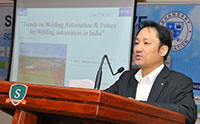 Mr. Hisashi Yamasaki San I, the Director of OTC Daihen India Pvt Ltd, Gurgaon, Mr. Kapil Dev Sharma, the Manager, technical support department of OTC Daihen India Pvt Ltd, Gurgaon and Mr. Kiran Thamankar (Deputy GM Sales Department), presently working with Japanese Welding & Robotic Multinational M/S OTC Daihen India Pvt Ltd, Gurgaon delivered a talk on “Trends on Welding Automation and Future for Welding automation in India”. They spoke about man power challenges in India and the fields these challenges can be dealt with like requirement of skilled personnel, financial assistance, return justification to the investment on the technology and so on. They enlightened the gathering on the different trends in automation and its future in Indian market. They touched upon the various welding technologies currently used in India and how it can be efficiently replaced by Robotic welding such as in thermit welding, arc welding etc. Finally, they briefed about their company right from its incubation in 1919 to its current status in global market.

Dr. Amar Kumar Pandey, Additional Director General of Police at Government of Karnataka, Bengaluru spoke on “Managing enterprise complexities” with specific reference to “Refugees right to return and reintegration – A comparative analysis of Bosnia-Herzegovina and Sierra Leona”. He has briefed about refugees rights to return and reintegration. He explained about the structure of solving complex problems by formulating strategies and perspective planning. He also described about the ontology of architecture of return. He referred to the 15 stages of return namely peace agreement, cessation of wars, demilitarization, conduct of election and so on.
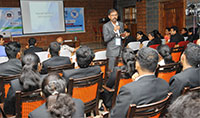
Mr. H V Dinesh Prasad, Founder Chairman & Principal, Noble School of Business, Bengaluru spoke on “Business Analytics”. He started his session by describing data analysis and various data measurement scales. He emphasized on the relevance of data driven decision making process using a live example. He went about discussing the uses and application of data analytics in day to day life by quoting varied examples. He showed the relationship that exists between analytic capability and organization value addition. He concluded his session by showing the application of SPSS software and interpretation of the same.
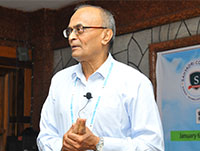
Prof. M N Vidyashankar IAS, Former Additional Chief Secretary spoke about “Water Revolution 2”. He explained how water sectors can be sustained in the country and the need to recycle wastewater. Recycling of waste water is the need of the hour as water shortage is felt throughout the world. He emphasised the need of effective methods for water recycling. He also explained how the countries like Israel and Singapore adopting new technology which have proved sustainable methods for water treatment.
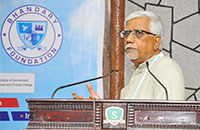
Mr. Ramakrishna Y B, the Chairman - Working Group on Bio Fuels Ministry of Petroleum & Natural Gas, Government of India spoke on “Climate change challenges – Importance of western Ghats”. He told Western Ghats are one of India’s largest natural carbon sinks and a biodiversity hotspot. He also mentioned that uncertain rainfall pattern is one of the biggest impacts of climate change. He explained how humanity consumption is outstripping the earth resources. He emphasised on the necessities for conservation of ecosystems in order to sustain the biodiversity, hydrology and ecology.”
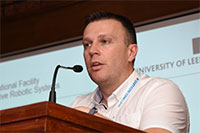
Prof. Robert C Richardson, the Director of the Institute of Design, Robotics and Optimization and Director of the Leeds EPSRC National Facility for Innovative Robotic Systems spoke on “Robotic Inspection maintenance and repair of urban water systems”. He held a prestigious research contract to explore the Great Pyramid of Giza, Egypt using robotic technology and has discovered writing in the Great Pyramid that was hidden for thousands of years. He explained regarding the structure, motors and sensors required to build the robot. He also explained about under-water robotics.
Day Three of Sahyadri Conclave
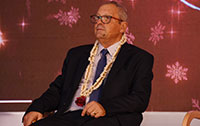
During the first plenary session on Day Three of Sahyadri Conclave, Prof. Joseph Sifakis, The Turing Awardi in Computer Science, Emeritus Senior CNRS Researcher, Verimag spoke on “The nature of computing”. He said that Information is in the mind of the beholder. He stressed that Theory of computation is time ignorant. He spoke about the meaning of computing, Domains of knowledge – abstraction theory and modularity. He introduced Linking physicality and computation using two approaches namely digital physics and natural computing. He concluded the talk by quoting a Greek poem called Ithaka by Constantine P Cavafy.
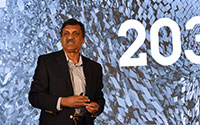
The second plenary session was by Padmashri Ananth Agarwal, CEO of edX who delivered a talk on “Digital Education Transformation”. In his talk, he introduced an online MOOC platform called edX, developed by Harvard and MIT, USA. He said that there are about 14 million (11% of Indians) students currently enrolled in edX which comprises of 2000 courses in partnership with around 130 global partners ( Premier institutes and companies). He also spoke about Micromasters programme and emphasised that future of education is going to be modular education. He discussed about open edX – an open source LMS of edX for launching online courses. He also emphasised on active learning and promoted instant feedback. He said Modular education, Omni channel and lifelong education are the three important trends that will shape future education.
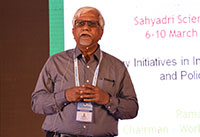
The third plenary session was by Mr. Ramakrishna Y B, the Chairman - Working Group on Bio Fuels Ministry of Petroleum & Natural Gas, Government of India who spoke on “Bio energy initiatives in India-Cutting edge technologies and policy frame work”. He stated that “The biggest wastage of resource in India is land”. He suggested that efficient utilisation of agricultural resource will solve most of the energy issues. He stated few case studies related to bio-energy initiatives in India. He also spoke about low carbon sectors including alternative fuels, cleaner fossil fuels and production of bio-fuel. He explained about the government schemes on natural fuel promotions.
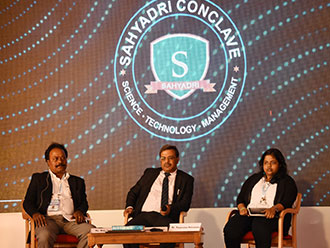
Panel Discussion was held on the theme “Energy”. The panellists were Mr. Rajashekar Hiremath, President, Flexitron, Bengaluru, Mr. Sanjay Sahay, the Additional Director General of Police, Government of Karnataka and Ms. Yugratna Srivastava, Programme coordinator, Plant for Planet initiative. They discussed about the methods which could be adopted to make India a self-reliant country in terms of non-renewable energy resources which would contribute to the overall economic growth of the country. They discussed about the climate deal summit held at Paris in the month of December 2017 which had 195 countries participating in it. This summit addressed the issues related to climate change, impact of storing energy & generating energy. The panellists also addressed the queries put forward by the audience regarding new inventions in the field of conserving non-renewable sources of energy.
Simultaneously, there were technical sessions held in various venues of Sahyadri to address the domain specific participants like Computer Science & Information Science, Electronics & Communication, Mechanical and also Management.
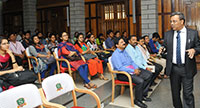
Mr. Sanjay Sahay IPS, the Additional Director General of Police, Government of Karnataka spoke on “Cyber Security”. He stressed on the importance of Cyber Security in our daily lives. He suggested the students, especially CS/IS Streams, to become cyber warriors to establish their credibility in the society. Mr. Sahay covered the core aspects of cyber security and highlighted the issues with real world examples. The integrity of data was emphasized during the session. During his talk, Mr. Sahay quoted various issues like Meltdown and Spectre, WannaCry Ransomware attacks, Decrypt Petya Ransomware, LAZARUS, Watering Hole Attacks, Digital Darwinism etc. He highlighted the importance of migration from IPv4 to IPv6 for enhanced security. He also called upon students to do self-learning for improving their skills and competence. He stressed on the importance of preserving the data, which can be anything like money, health, assets, life etc. He concluded the session by quoting “Solution is not a Product and Product is not a solution”.
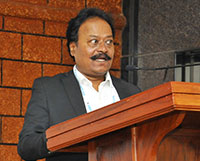
Mr. Rajashekar Hiremath, President, Flexitron, Bengaluru delivered a talk on “Future of Human transportation”. He stated that slow movement of vehicles in urban areas is 6 km/hr which causes huge man hours to be wasted and also causes pollution which intern leads to death by stress. Things which are required to check for traffic are speed of vehicle moving per hour, number of vehicles present in the path and also the number of people trying to overtake. To reduce the traffic jam, one of the major solutions would be to ban private vehicles by 2050 and to motivate public transports, self-driving cars (unmanned cars). He also illustrated the initiatives taken by BMW motors where they implemented sensors for collision avoidance and to detect the direction of movement.
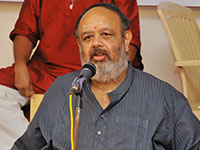
Mr. Anoor Anantha Krishna Sharma, a Mridangist & the Founder of Anoor Anantha Krishna Sharma Foundation for Music, Bengaluru delivered a talk on “Mathematics in South Indian Classical Music with special emphasis on percussion instruments”. He stated that each and every stroke of the music tunes are going to be calculated mainly addition and subtraction. The main Kriyas are Shashabdha Kriya and Nishyabdha Kriya. The basic Thala of the music is Adi Thala. The oral numinous of the music is known as thala. The 3 speeds of music include: 8 bit, 16 bit (Rhythmic one) & 32 bit. The geometrical composition is Yathi’s. The uniform structure of beats is Samayathi. Structure of Mrudanga is Mrudangayathi. Structure of Damaru is Damarugayathi. Structure of Gopura is Gopuchchayathi. Structure of V is Shrothuvahayathi. He also spoke about the permutation and combination of maths in music. He stressed on the different types of phrases and said that playing music in higher beat is URUTU.
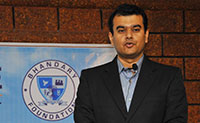
Mr. Rahul Kini, Sr. Manager, Finance Operations, Target Corporation Bengaluru apprised the audience on “Operations Management in ITES”. He began his session by sharing his own journey, hardships and experiences. He said “Failing is extremely important as it leads to the path of success”. He deliberated on the evolution of IT and ITES and the opportunities in this sector in the future. Mr. Rahul pointed at few critical success factors for the future managers namely Knowledge, Skill and Attitude.
 Prof. Serge Haroche, a Nobel Laureate in Physics discussed about “How Laser has Revolutionized Physics in Last Fifty Years”. He gave a brief history of Lasers. He pointed out the differences between the Classical Lights and the Laser Lights. He continued the session by explaining various types of Lasers. He also spoke about how laser has made tremendous progress and has led to quantitative and qualitative revolution in basic research. Prof. Haroche also illustrated the history of measurement of time by highlighting various kinds of devices used for measuring time across various generations. He listed out the scientists who won Nobel Prize in the field of Laser. The session was moderated by Dr. Shankar Prasad, Founder and Chairman, Sampurna Swaraj Foundation.
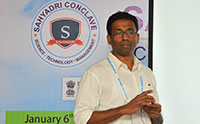
Mr. Deva P Seetharam, one of the co-founders and the CEO of DataGlen spoke on “Lifelong kindergarten: a fun approach to engineering a career”. Mr. Seetharam started his speech by giving an example of the movie which inspired him, Sachin - A Billion Dream. He also said to read some of inspirational books like “The pleasure of finding things out” by Richard Fegnuan, “For the love of the physics” by Walter Lewis and “The Joy of mathematics” by Anthur Benjamin. According to him, all these books convey message to Love whatever you do. He was emphasizing on problems in education system where marks is the base for the career. Students choose professional courses as a matter of prestige. In some part of India, it may be a matter of Dowry system. He was encouraging Indian women to take professional courses. After doing engineering, there are many opportunities like IAS, Engineering, Professor, entrepreneur, pilot, and management.
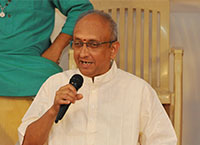
Mr. V Krishna Venkataram, Professor & Head, Mechanical Engineering, PES Institute of Technology, Bengaluru spoke on “Mathematics in South Indian Classical Music with Special Emphasis on Percussion Instruments”. He briefed about koruppu, the session where they reduce the time and increase the bits levels. He explained about the Thala, where Thala is the musical time, i.e., physical act. The time difference between each thala is kept constant. He explained about LAYAGNANA is the ability to maintain the time in Thala. He demonstrated Adithala with 3 bits to 9 bits. He even told that western art of music are simple than the Indian. He briefed about Avadhana, Ashtavadhana, Shathavadhana. He briefed about Atheetha edupu and Anagatha Edupu. He suggested to read the book by L Rajarao on the music i.e., Sangeetha Chandra mohana.
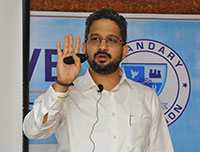
Mr. Chethan Shenoy, Associate Director & Head of Investment Products Anand Rathi Securities, Mumbai delivered a talk on “Application of Financial Planning & Wealth Management”. During the session he explained various strategies an individual must formulate for wealth management and its implementation. He further explained various scenarios of investment and emphasized on the key to a wealthier future which lies in Knowledge and Application of the Knowledge. He gave away six lessons for every amateur investor which could lead them to better returns in their investment. He stressed on how proper asset allocation can help in increasing ones wealth over a period of time taking into consideration various risks associated with it. He advised the crowd to start early in order to get better returns in the long run.
Afternoon Sessions of Day Three
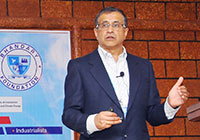
Mr. Prakash Bettadapur, Senior Advisor, Dhiomics Analytics Private Limited delivered a talk on “Successful Agile Transformation Ingredients”. The traditional ‘Water Fall Model’ fails to meet the requirements due to rapid changes in the software field. To overcome this limitation ‘Agile’ transformation is adapted. Agile transformation involves customer collaboration and response to the rapid changes in the field of development. He introduced the term ‘Scrum’ which is a framework for managing the process.
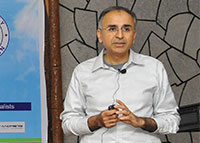 Dr. Anish Arora
Dr. Anish Arora, Professor, Ohio State University, USA, delivered a session on “Cyber security issues of IoT”. In his talk, he emphasized on the building of IOT and he gave a glimpse of how one can assemble a simple IoT device. He also spoke about the trends in IoT. He addressed about the various security issues in IoT, and ways to handle them. He also emphasized on models of cyber security and different surface attacks. He spoke about several standards and regulations to solve security issues with respect to IoT.
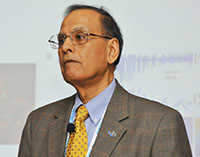 Prof. Satish K Tripathi,
Prof. Satish K Tripathi, President, University at Buffalo, USA delivered a session on “Research challenges of 21st Century - a University at Buffalo perspective”. He gave overview of various research activities which are carried out at the UB University. During his talk, he highlighted the challenges for engineering in 21st century and he also mentioned about its cross cuttings. He emphasized on few challenges such as making solar energy economical, enhancing virtual reality, reverse engineering the Brain etc. He concluded by giving a glimpse of efficient learning and understanding of Big Data.
 Prof. Serge Haroche, Prof. Serge Haroche, Noble Laureate in Physics delivered a talk on “A story about the interaction of light with matter in which water plays an important role”. He said that Quantum theory has opened to us the microscopic world of particles, atoms and photons. He explained Controlling Photons in a Box and Exploring the Quantum to Classical Boundary. He also said that the recent experiments controlling single particles lead us to believe that quantum strangeness could be harnessed to develop new communication or computing tools.
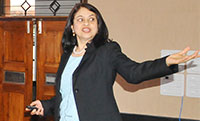 Prof. Anuradha Agarwal
Prof. Anuradha Agarwal, Principal Research Scientists, Massachusetts Institute of Technology, USA introduced the topic by speaking about smart food which is a journey from the Farm to the table. It includes food growth, transport, distribution and consumption. Photonic sensor is widely accepted because of wireless communication and need of surveillance and security of the society. The photonic sensor uses photons which are light particles for sensing operation. Integrated photonic sensors is the next level of photonic sensors uses optical fibre cable to transmit light from one end of the chip to the other end.
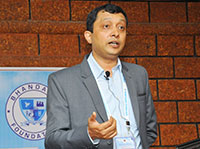 Mr. Bharath Shivappa
Mr. Bharath Shivappa, Director, Clients & Markets, Deloitte facilitated a session on “Marketing, a consulting services firm”. He started his talk by enlightening the students on his life experiences. He emphasized on 4 P’s of product mix and 7 P’s of Service Marketing. He touched upon Marketing Professional Service Firms and sales approaches used to win clients. He concluded his session by using 2 strategies to builds a client i.e Hunt and Farm.
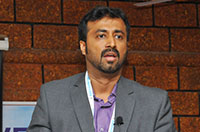 Mr. Dileep Chandra
Mr. Dileep Chandra, India Country Manager - HRGS, HP Inc India addressed the gathering on “HR Shared service model”. He spoke his life experiences of struggle and hardships. He spoke on the model of HR shared services, activities and challenges of the HR shared service domain.
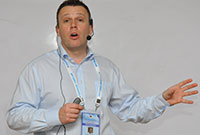 Prof. Robert Richardson
Prof. Robert Richardson, Scientific Researcher in Robotics, Leeds University, UK spoke on “Robots are tools to design to achieve human goals”. He elaborated the use of Robots in the field of Agriculture. He said that Robots should not be designed to harm human beings. Robots can operate in many environments. Underwater- Materials to withstand pressure, Corrosion, Sealing of moving parts. Explosive proof- Design to prevent explosive mixtures.
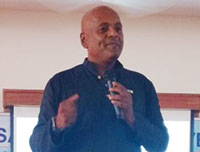 Mr. Rajendran Dandapani
Mr. Rajendran Dandapani, Business Solutions Evangelist, Zoho Corporation spoke about startup thinking, startup rules, and ideas of startup. He explained about history of Zoho Corporation, products of zoho, and about softwares. He gave tips to young talents about what to start and how to start using some quotes and with outstanding examples such as Facebook, Orkut, Gmail, etc.
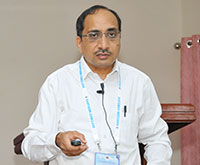 Dr. Suresh Nagesh
Dr. Suresh Nagesh, Managing Director, Voith Engineering Services spoke about needs, opportunities and challenges in the field of alternative energy resources, how increase in the demand of global energy affects the economic growth, lifestyle of people and vice versa. The main source of energy in many countries still is usage of fossil energy and it is Time not to think, but through action to replace the use of fossil fuels with alternative energy sources. He also emphasized on careful selection of alternative energy sources by considering its reliability, effect on environment, lifestyle etc.
Day Four of Sahyadri Conclave
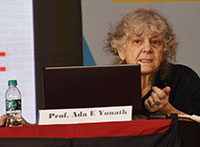
During the first plenary session on Day Four of Sahyadri Conclave Prof. Ada E Yonath, Nobel Laureate in Chemistry delivered a talk on “The Fruits of Curiosity”. She said that curiosities and passion brought her the position where she is now. She discussed that an organism's vital functions are managed by large, complex protein molecules produced in cells ribosomes and their genetic information from "messenger RNA" is translated into chains of amino acids that then build proteins. She mentioned about 20 types of Amino Acids. She explained about the functions of proteins in the lives of all organisms. She said that stress induces periodically packing of ribosomal particles. She stated that she was inspired by Madam Marie Sklodowska Curie.
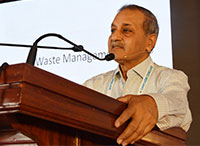
The second plenary session was by Dr. D P Agrawal, Former Chairman, UPSC of India on the topic - “Waste Disposal”. He emphasized the significance of different types of wastes (E-waste, Industrial waste, Building, and Agriculture waste) and its impact on Environment. He also stressed about the technology to manage the daily wastes in home appliances. Further, he enlightened on waste management with respect to collection, segregation, transportation and disposal. The technology to manage the solid waste in home appliances is explained briefly with example. The laws and regulations undertaken by the government namely Swachh Bharath Abhiyan had shown 70% success in open defecation.
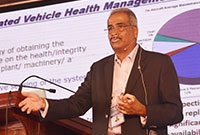
The third plenary session was by Mr. C D Balaji, a distinguished Scientist and Chairman, Centre of Excellence in Aerospace and Defence (CEAD) and Former Director, Aeronautical Development Agency who delivered a session on “Aerospace environment and ecosystem”. He spoke about various environmental challenges in aeronautics which included air quality and particulate emissions, aircraft noise, water pollution from airline services and radiation exposure generally seem in the field of aeronautics. He also highlighted various methods adopted in the current era to mitigate these issues. In a nutshell he also spoke about light combat aircraft design and multiple threat scenarios involved in the design. Combat Aircraft Technology Drivers, Design and Development Approach, Development Cycle of Fighter Aircraft, Evolution of Design Tools, Simulation and CFD Studies, Typical Aircraft Build Cycle and Integrated Vehicle Health Management were the important highlights of his session.

Panel Discussion was held on the theme “Environment”. The panellists were Prof. Jagadeesh Gopalan, Professor, Aerospace Engineering, IISC, Bangalore, Prof. S S Murthy, Vice Chancellor, Central University of Karnataka, Dr. B K Ravindra, Vice Chancellor, Alliance University, Bengaluru and PadmaShri Prahalad RamaRao, Advisor; S-VYASA University was the Moderator. They discussed about environmental changes and its effects on generations to come. Topics like concerns about the environment, likely solutions, sustainability and prevention of the same were addressed in the panel discussion. Dr. B K Ravindra highlighted the legal aspects and laws prevalent in India for preventing pollution and aiding environmental protection. Dr. Jagdeesh stressed on keeping our environment clean by adopting clean mind and practices. Dr. Murthy professed that an individual’s role is critical in controlling environmental damage and contributing to the society.
Simultaneously, there were technical sessions held in various venues of Sahyadri to address the domain specific participants like Computer Science & Information Science, Electronics & Communication, Mechanical and also Management.
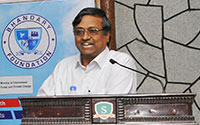 Prof. Gopalan Jagadeesh
Prof. Gopalan Jagadeesh, Department of Aerospace Engineering, Indian Institute of Science (IISc) Bangalore delivered a session on “Enchanting Waves”. He started the session by distinguishing Science, Engineering and Technology. He quoted the importance of working with interest rather than working out of pressure. He discussed the concept of Shock waves and its uses in various fields. He brought out the role of various disciplines involved in constructing a technology. He stressed on the importance of being employer rather than being an employee.
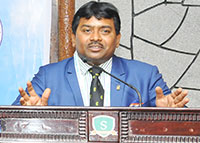 Dr. Hari Krishna Maram
Dr. Hari Krishna Maram, Chairman, Imperial College of Business Studies, Bengaluru spoke on “Management and Technology”. In his talk, he discussed about achieving success by thinking differently by quoting various examples. During the discussion, he brought out the statistics about the contribution of Indians to the World economy. He gave a glimpse about the booming technologies in IT field and motivated the students to excel in them.
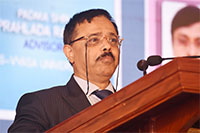 Dr. B K Ravindra
Dr. B K Ravindra, Vice Chancellor of Alliance University, Bengaluru enlightened the students about “Utility and scope of Intellectual property rights”. He, in his deliberation said that every citizen should know his rights and duties as stated by the constitution of India- if we have to achieve Gandhiji’s dream of ‘Welfare State’. He described the evolution of Intellectual property rights stating examples of Takshashila University and Shushrutha’s development of 142 instruments. He emphasized on the fact that one’s right is their ‘property’ and intellectual property rights protects the person’s property. He also highlighted on various examples viz., use of turmeric and neem wherein we have lost the freedom to use our own inventions and innovations as the patent filing was done by the others.
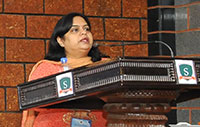 Ms. Anita Pai
Ms. Anita Pai, Senior General Manager and Head- Customer care, ICICI Bank Mumbai delivered a talk on “Application of New technology in Banking”. Ms. Pai started her session by dwelling on the topic of Risk Management in the Banking sector. She introduced to the audience the Global presence of ICICI Bank and spoke about the coverage of operations group of the bank. She enlightened the students about the innovation journey of ICICI bank from 2001-17. With the help of videos, she showed the audience that there has been a transformation from paper based transactions to digitalization. She concluded her session by giving an insight about various new technologies used in ICICI bank namely, Robotic Process Automation, Robotic Arm and Note Sorting, AI, API Integration, NLP and Chat Bot.
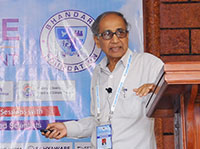 Prof. S S Murthy
Prof. S S Murthy, Vice Chancellor, Central University of Karnataka delivered a talk on “Renewable energy”. He discussed about importance, theoretical potential and classification of renewable energy. He also emphasized on UNFCC Paris Convention Resolutions which gave a message of reducing the global warming throughout the world. He discussed about the different ways of conversion of energy and technology in India.
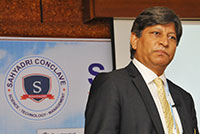 Dr. Sathya Prakash
Dr. Sathya Prakash, Director of Biomedical Technology and Cell therapy research laboratory spoke on “Microbiome next generation therapeutics and health food and cardiac stent”. The session was about how microbiomes can be used to lower the cholesterol in the human body. He explained about the Stent and next generation of Stent. He also presented the advantage of insect virus. The insect virus is also classified safe by FDA and hence this is an inexpensive way to lower the cholesterol in the human body.
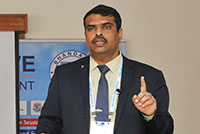 Prof. Veerbhadra Yadwad
Prof. Veerbhadra Yadwad, Product Manager, Environmental & Analytical Business Unit, Yokogawa India Limited delivered a talk on “IoT Application”. The speaker briefed about the role of engineers in the industry and how to identify the solutions for the challenges in the industries. He explained briefly about the types of the sensors and the problems that are shooting in process industries, in aquatic industries by maintaining the pH level of the water by using the sensors. He also explained how to control the pH level by lime dosing and monitoring them by exchanging the data through wireless Medias. Finally, he mentioned how the required quantity of air for boiler in combustion process can be supplied.
Afternoon Sessions of Day Four
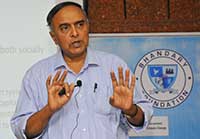
Mr. Ananth Ravi, Senior VP and Sponsor, Reliance Industries Ltd spoke on “Paradigm Shift in Indian Entrepreneurship over last 4 decades”. He started his session with the definition of entrepreneurship. According to him, “Entrepreneurship is living a few years of life like most people won’t so that you can spend the rest of your life like most people can’t”. Citing the examples of great entrepreneurs like T. M. A. Pai, Dhirubai Ambani and Adi Godrej he took the audience through the entrepreneurial journey. He also discussed about triple option convertible debentures and how it was used as a debt instrument. The session concluded with open question to audience – “How will artificial intelligence do emotional thinking?”
 Mr. C D Balaji
Mr. C D Balaji, the former director of LCA at Aeronautical Development Agency delivered a talk on “Design And Development challenges of a Fighter Aircraft: LCA Navy”. He spoke about Light Compact Aircraft (LCA) – Tejas and about its characteristics and features. He explained the challenges faced during LCA programming, different types of carriers, achievements of LCA Navy. He also spoke about development cycle and design cycle of aircraft, evolution of design tools. He explained about different types of take-off and landing of STBF.
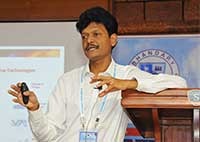 Dr. U. Chandrasekhar
Dr. U. Chandrasekhar, Pro Vice Chancellor of Vel Tech University spoke on “Fostering creativity and innovation among engineering students through exponential teaching learning model”. The speaker suggested a model, CDIO (Conceive Design Implement Operate) as it is a kind of learning based on whole process of an engineering project. He also said social entrepreneurship needs to be encouraged so that along with income the needs of the society are met. He encouraged students to develop IOT enabled rooms at Sahyadri.
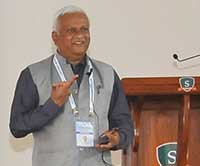 Dr. V. Krishna Murthy
Dr. V. Krishna Murthy, Registrar & Professor, Department of Biotechnology, PES University, Bengaluru spoke about “Pollutants in our Environment”. He said that one of the greatest problems the world is facing today is environmental pollution increasing with every passing year and causing grave and irreparable damage to the earth. He highlighted on topic such as environment, natural pollutants, metallic pollutants, Bad effects of rocks salt metals, stock pollutants, fund pollutants, water pollutants and acid rain cycle etc. He also emphasized that the pollution is not individualistic threat to environment; instead it is the inter-link between the pollution at the level of soil, river, air etc and need many innovative and modern methods to deal with this problem.
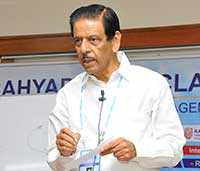 Mr. B. A. Hasanabba
Mr. B. A. Hasanabba, Former Member of Legislative Council, Bengaluru delivered a talk on “Math Magic”. He spoke about the essence of mathematics in the academic field. He showed the students about the fun side of mathematics. He highlighted the importance of mathematics and their some inventions. He gave insight about perfect numbers, deficient numbers, abundant numbers etc and their applications. He addressed on the tricks involved in the mathematics addition, multiplication, subtraction, division for numbers involved smaller to larger digits.
 Dr. Bashir Ahmed Ganai
Dr. Bashir Ahmed Ganai, Professor, Director CORD &Head, P.G. Department of Environmental Science, University of Kashmir, Srinagar delivered a talk on “Disaster due to Brick kiln Emissions”. He emphasized on environmental pollution. He continued the session with the introduction of brick and it’s making process. He spoke about impact on health in both human and plants at local and global level. He showed the survey conducted by himself and his students at some of the villages in Srinagar where more brick manufacturing industries exist. He listed and explained the different disease caused by brick manufacturing which will affect the human health. He also recommended the use of new technology like increasing the height of the chimney in industries.
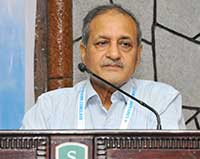 Dr. D P Agrawal
Dr. D P Agrawal, Former Chairman, UPSC, India delivered a talk on “Environmental Friendly Technology”. He started his talk by urging students to have goals to start technology which is eco-friendly. He spoke about the importance of water recycling, rain water harvesting and water purification. He also mentioned about how countries like Israel has adopted new technologies to reduce the water consumption in different areas. He also spoke about solar energy & solar panels to produce electrical energy. He discussed about electrical cars which avoid the use of petrol and diesel. He also said that natural gases are less pollutant.
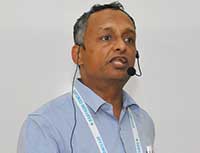 Prof. Nataraja Karaba N
Prof. Nataraja Karaba N, Department of Crop physiology, University of Agricultural Science, Bengaluru spoke on “Food security in India”. He started his session by giving the information about the origin of agriculture. He told about the research focus on Molecular biology/transgenic facility in GKVK, Bengaluru. During 1950’s food which we ate were not grown only in India but from different parts of the world. He quoted the words of Jawaharlal Nehru “Everything else can wait but not agriculture”. He mentioned about Mr. M S Swaminathan who is responsible for the Green Revolution in India which developed high yielding varieties of wheat and rice. Due to overpopulation, increasing crop yield is the fundamental challenge for the agricultural industry. Next generation technology and its application to agriculture is required to push the limits of productivity. He encouraged the students to do research in agriculture field.
Concluding Day – Day Five of Sahyadri Conclave

During the first plenary session on Day Five of Sahyadri Conclave Prof. Serge Haroche, Noble Laureate in Physics delivered a talk on “Manipulating single photon in a box-with a discussion on the future of quantum technology”. He spoke about Fundamental particles such as photons that are difficult to isolate from their environment without destroying. He mentioned about quantum computers. He said that Computers power and speed has exponentially increased since the 1950’s because the size of the bits has continuously decreased due to technological improvements. He mentioned that the way to keep increasing the power is to exploit quantum effects. He discussed about circular Rydberg atom to detect photons without destroying them.
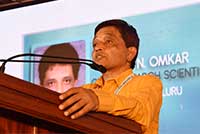
The second plenary session was by Dr. S N Omkar, Principal Scientist, Department of Aerospace Engineering, IISC, Bengaluru who delivered a talk on “Yoga for Holistic Health”. He started his session with the essence of Bhagavad Gita in today’s life. He stated that “Health is not just a report that comes out of Clinical Laboratory”. He spoke about the principles and practices of Swami Vivekananda and also about the speech delivered by Swami Vivekananda at Chicago that inspired many people throughout the globe. He enlightened the students that “Health is considered as a small parameter, wherein its process needs to be cultivated as 4D (Discrimination, Discipline, Difficulty and Desire) culture”. He mentioned about the significance of Yoga, Power of speech, Tattva Bodha, Thithiksha, Sraddha, Samadhana, and focus of mind would enlighten and elevate to greater extent.

The third plenary session was by Prof. Ada E Yonath, Noble Laureate in Chemistry who spoke on “From Basic Science to Advance Medicine”. She emphasized that the greatest threat to existing medicine is the resistance to medicine. Pathogens being clever have made themselves resistant to antibiotics during the due course and days are near that no antibiotic may be able to cure bacterial infections, but nothing much progress has been done in the development of new antibiotics. Ada, with her discovery of active binding sites in the pathogens and the understanding of ribosomal involvement in protein synthesis has given a spark for synthesis of new antibiotics and after her findings have been published, many antibiotics have been synthesized since last ten years.
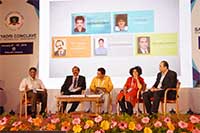
Panel discussion was held on the theme “Health”. The panelists were Dr S.N. Omkar, Chief Research Scientist, IISc, Bengaluru, Prof. K Byrappa, Hon'ble Vice Chancellor, Mangalore University, Dr. Dipshika Chakraborthy, Professor ,IISc, Bengaluru, Dr. Anand Venugopal, General practitioner, KMC Hospital & Mr. Kamlesh Manuja, Head Business Operations, Edelweiss Ohio Life Insurance, Mumbai. The session was moderated by Dr. S N Omkar who spoke about Vedic texts and their view in health of the body and mind. He stressed on practicing Yoga and meditation. Prof. Byrappa spoke about dedicating at least 90 minutes per day towards self-health. Dr. Dipshika emphasized on keeping the gut flora microbes healthy for long and healthy life. Dr. Anand Venugopal spoke about developing primary health care system to reach wider community. Mr. Kamlesh urged youngsters to have a financial plan at a young age.
Simultaneously, there were technical sessions held in various venues of Sahyadri to address the domain specific participants like Computer Science & Information Science, Electronics & Communication, Mechanical and also Management.
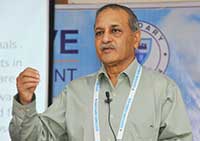 Dr. D P Agrawal
Dr. D P Agrawal, Former Chairman, UPSC of India delivered a talk on “IT and Health Delivery Systems in India”. He enlightened the students on the existence of IT systems in the field of health. He discussed about the critical sectors of India, bioterrorism and the layers of Indian health system. He also spoke about Clinical informatics to promote patient safety (CLIPS) used in the field of health and Small business innovative research programmes (SBIR). He mentioned about the WHO norms, electronic health records and the use of mobile vans.
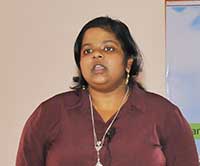 Ms. Yugratna Srivatsava
Ms. Yugratna Srivatsava, Programme coordinator, Plant for Planet initiative delivered a talk on “Renewable Energy Technologies”. She discussed about the reasons for the climatic changes in the environment due to industrial revolutions. She spoke about the history of the climate negotiations, UNFCC, a document ratified by 191 countries by secretariat Germany. She urged the students to think on “The 1.5 degree Celsius target, how do we reach it? The solution of the climate change is many fold and complicated i.e., by preserving the cold areas by adopting them. Climate change helps us to use renewable energy sources. India is trying to move away from the use of fossil fuels. She explained about the green energy corridor programme.
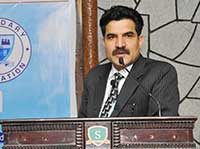 Dr. Basheer Ahmad Ganai
Dr. Basheer Ahmad Ganai, Professor, Director CORD & Head of P.G. Department of Environmental Science, University of Kashmir, Srinagar delivered a session on “Diabetics and Environment”. He gave a detailed overview of Diabetes Mellitus. He also stressed on the fact that environment plays a key role in accelerating various diseases. He concluded the session by advising the students to create awareness about diabetes in the society.
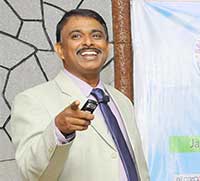 Dr. D. Antony Louis Piriyakumar
Dr. D. Antony Louis Piriyakumar, Professor, PES University, Bengaluru, delivered a session on “Bionic Eye”. He started the session by quoting that information is the key in 21st century. He mentioned that the visually impaired orphan students inspired him to create a technology through which visually impaired people can live independently. As a result of this, he has carried out several researches in the field of Bionic Eye. During the session, he highlighted on the technology behind the bionic eye, its working, its pros and cons along with its challenges.
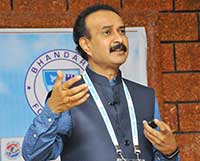 Mr. Prashanth Prakash Mr. Prashanth Prakash, Partner, Accel Partners, Bengaluru spoke on “How to start a start up & Digitalization of Economy”. His session was on how digitalization has transformed the industry. In the wake of that, he defined transformation & the several sub- sets of digitalization. He threw light on the role of data analytics and how data helps in personalizing a customer’s virtual experience. He dwelled on the “Idea of Network Effect”. He concluded his session with case studies on Blue stone, Bizongo & Black buck.
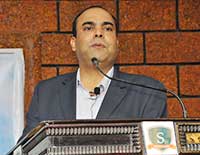 Mr. Kamlesh Manuja
Mr. Kamlesh Manuja, Head of Business Operations, Edelweiss Tokio Life Insurance, Mumbai spoke on “Operational efficiency through digitization”. He took the students through the journey of digitalization of insurance segment from the Indian context. He also put across the challenges and opportunities in the said segment and tried to focus on customer centric solutions and innovations. He enlightened the audience about how the new generation on-boarding model works. He gave two live cases studies on General insurance & Life insurance to show how digitalization has impacted & improvised the entire experience of insurance.
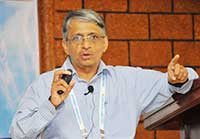 Prof. Gopalkrishna Hegde
Prof. Gopalkrishna Hegde currently working at Centre for Nano Science and Engineering, Indian Institute of Science, Bengaluru delivered a session on "Nano Technology techniques and Challenges". He started his session by giving introduction to nanotechnology and compared the size of human red blood cells with nanorods. The session also emphasized on need for nanotechnology. He discussed about the application of nanotechnology in medicine, environment, energy, information and communication, heavy industry and consumer goods. The session also covered many important topics like mems and nems based gear system, atomic force microscope, scanning tunneling microscope, two main approaches for nanofabrication (top down and bottom up), conventional nanofabrication techniques, semiconductor lithography and types of lithography, semiconductor processing.
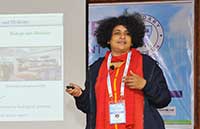 Dr. Dipshika Chakravorthy Dr. Dipshika Chakravorthy, Professor, Department of Microbilogy and Cell Biology, IISc , Bengaluru spoke on “Biomedical application of shock waves”. The session was about the needleless vaccine delivery system and its advantages over vaccine delivery through oral route and injection. This needleless system is based on the pressure profile which helps to inject the vaccine about 60 micrometer depth under the skin where the immune building “langerhan cells” because of which 100% of mice under vaccination got survived. The needleless vaccine delivery system makes the immune system robust. Thus this is an inexpensive method for vaccinating much kind of diseases such as typhoid, diabetes, cholera and tuberculosis were discussed during the session.
Valedictory Ceremony of Sahyadri Conclave – Science, Technology & Management
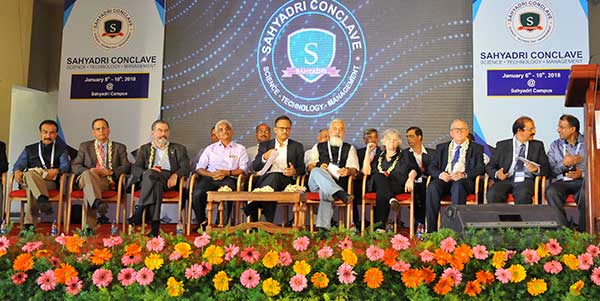
During the Valedictory Ceremony, Mr. Manjunath Bhandary, Chairman, Bhandary Foundation shared the journey of the last five days of Sahyadri Conclave. He proclaimed that at the closure of Sahyadri Conclave, the end goal has been achieved which was to inspire students in the field of Science, Technology and Management. As evidence to the outcome being met, 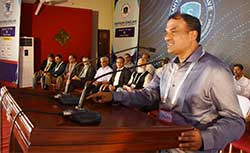 he was fascinated to see students approaching the Nobel Laureates and the scientists & discuss their ideas & projects. He appreciated Sahyadri Staff and Students for managing such a great event and proudly acclaimed that the entire five-day event was organized and managed by the in-house team. He expressed his willingness to hold Sahyadri Conclave next year as well to reach greater number of students with the support of the Government and other stakeholders.
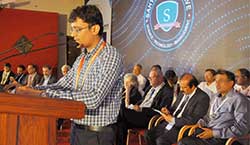
Prof. Anush Bekal, Dept. of Electronics & Communication gave the overview of the Conclave and reported the day-wise event of the Plenary Sessions, Panel Discussions, Technical Sessions, Exhibition & Cultural Programme.
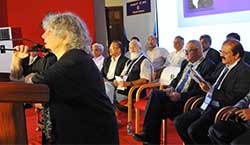
Ada E Yonath, Nobel Laureate gave feedback of a whole new experience she had during Sahyadri Conclave in Mangaluru. She was touched by the enthusiasm of students and appreciated that the questions they asked were good. She urged students to get busy with Science and come up with fantastic new equipment.
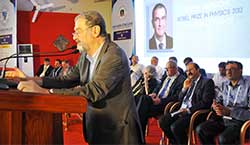
Serge Haroche, Nobel Laureate while speaking to the gathering praised the curiosity of the students and the interactive sessions during Sahyadri Conclave. He said students of Mangaluru have deep quest for knowledge and appreciated Sahyadri for its encouragement to such students.
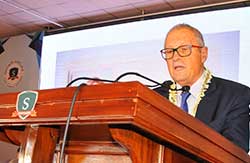
Joseph Sifakis, Turing Awardee in Computer Science expressed his happiness to interact with the young students. He observed that they have huge motivation for learning and stimulated them to add meaning to their life and make it worth living with their achievements in the field of science.
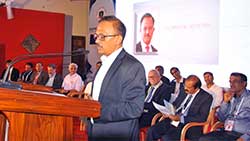
Chief Guest - Mr. Gaurav Gupta, IAS, Principal Secretary, Department of Information Technology, Biotechnology and Science & Technology, Government of Karnataka in his valedictory remarks expressed how happy he was to be seated amongst the brightest of the world. He conveyed the various initiatives of the Government of Karnataka to drive innovation, generate interest among female students in science, incubation network centres and also about the support in terms of funded projects and grants to interested students. He announced that there are Incubation Network Centres set up in totally 20 colleges and Sahyadri College of Engineering & Management is one among them. He urged students to be Job creators rather than Job seekers hence focussing on star-ups as career.
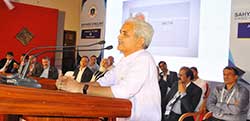
Guest of Honour - Prof. Uma Maheshwar Rao Karanam, Director, NITK, Surathkal appreciated the Conclave by referring to the Resource persons & the theme. He advised students NOT to get disconnected with the society and the world. He encouraged them to start developing Hypothesis of any area of interest in science, evaluate it with experiments, analyse the results and communicate it to the society. He appreciated the theme – Science, Technology & Management wherein Management shall re-engineer the processes of science & technology required for the society.
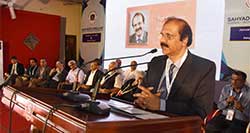
Guest of Honour - Prof. K. Byrappa, Hon'ble Vice Chancellor of Mangalore University appreciated the concept of bringing variety of specialists, technocrats of various disciplines together for a Conclave. He had words of praise for Sahyadri since it is a budding institution just 10 years old and has given opportunities for thousands of students to listen to the Nobel Laureates and Scientists.
Two-Day Workshop on “System Design in the Era of IoTs” by Prof. Joseph Sifakis, Turing Awardee
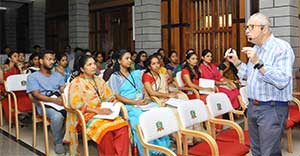
Two-day workshop on “System Design in the Era of Internet of Things” by Prof. Joseph Sifakis, Turing Awardee is organized during 11th to 12th January 2018. On the Day One of the workshop, Prof. Sifakis discussed about technological convergence, vision, scientific and technical challenges involved in Internet of Things (IoT). He also emphasized risk factors affecting IoT systems. He also mentioned about the present day application that uses IoT to communicate between electronic devices.
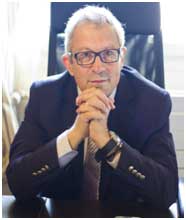
Prof. Joseph Sifakis is Emeritus Senior CNRS Researcher at Verimag. His current research interests cover fundamental and applied aspects of embedded systems design. The main focus of his work is on the formalization of system design as a process leading from given requirements to trustworthy, optimized and correct-by-construction implementations. He has been a full time professor at Ecole Polytechnique Fédérale de Lausanne (EPFL) for the period 2011-2016. He is the founder of the Verimag laboratory in Grenoble, which he directed for 13 years. Verimag is a leading research laboratory in the area of embedded systems, internationally known for the development of the Lustre synchronous language used by the SCADE tool for the design of safety-critical avionics and space applications. In 2007, Professor Joseph Sifakis has received the Turing Award for his contribution to the theory and application of model checking, the most widely used system verification technique today. He has participated in many major industrial projects led by companies such as Airbus, EADS, France Telecom, Astrium, and STMicroelectronics. He is a member of the French Academy of Sciences, a member of the French National Academy of Engineering, a member of Academia Europea, a member of the American Academy of Arts and Sciences, and a member of the National Academy of Engineering. He is a Grand Officer of the French National Order of Merit, a Commander of the French Legion of Honor. He has received the Leonardo da Vinci Medal in 2012. Joseph Sifakis has received the Award of the Hellenic Parliament Foundation for Parliamentarism and Democracy in 2009. He is a commander of the Greek Order of the Phoenix. He has been the President of the Greek Council for Research and Technology for the period February 2014 – April 2016.
MBA Rank Holder receives appreciation from the Associate Director, KPMG Global Services
Ms. Pallavi Singhal, Associate Director-Campus Lead KGS, KPMG Global Services has appreciated Ms. Sayona Joseph, (MBA Alumna 2015-17 Batch) for securing 6th rank in VTU exams. Sayona is currently working with KPMG, Bengaluru.
“Dear Sayona, Many congratulations on securing the 6th rank in the university exams. You have made us extremely proud. Best wishes for a great career with KPMG!”
Noble Laureate inaugurates Sahyadri Mech-Tech Garage
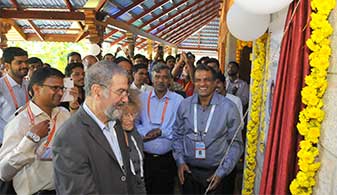
Nobel Laureate Prof. Serge Haroche and his wife Ms. Claudine Haroche have inaugurated the Mech-Tech Garage in Sahyadri Campus. Mech-Tech Garage is a facility made available by Bhandary Foundation. Students design, build and test vehicles such as Student version of Formula car, All Terrain vehicle and Go-cart to participate in National & International competitions organized by Society of Automotive Engineers (SAE). Addressing the students, Prof. Serge appreciated the efforts of Mr. Manjunath Bhandary, Chairman, Bhandary Foundation and wished that the facility boost the learning & understanding of technology and also assist students in acquiring the necessary skill sets.
Mr. Manjunath Bhandary, Ms. Prasanna Bhandary, Secretary of Bhandary Foundation, Mr. Balakrishna Bhandary and Mr. Devadas Hegde, Trustees, Bhandary Foundation, Mr. Prashanth Prakash, Partner, Accel Group of Companies, Dr. D. L Prabhakara, Director, Dr. Umesh M Bhushi, Principal & Prof. Balakrishna S S, Vice-Principal were present during the occasion.
Commencement of Survey Camp for the students of Civil Engineering
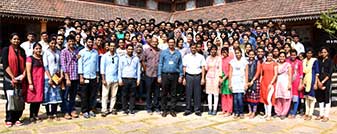
130 students of 6th semester Civil Engineering are participating in the extensive survey camp during 12th January 2018 to 23rd January 2018 at Siddapura. The students will be carrying out projects prescribed by the university. Dr. Umesh M Bhushi, Principal and Prof. Balakrishna S S, Vice-Principal conveyed their best wishes to the students and faculty.
Student Counsellor invited as Resource Person for the Annual Special NSS Camp organized at Punjalkatte
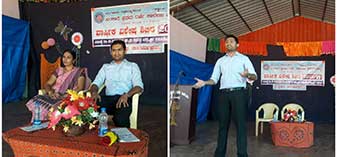
Mr. Ankith S Kumar, Student Counsellor was invited as a resource person to demonstrate the extraordinary powers of the mind for the undergraduate B.Com students of Govt. First Grade Degree College, Punjalkatte during their Annual Special NSS Camp. He demonstrated and explained the Extra sensory Perception powers of the mind, illustrated how the mind receives information through senses, encoding and decoding, the memory capacity and signal strength of the mind, deja vu, dream analysis, sleep disorders, power of intuition, death, afterlife and paranormal experiences were also explained to the students through case presentations.
Inauguration of Augmented & Virtual Reality Lab
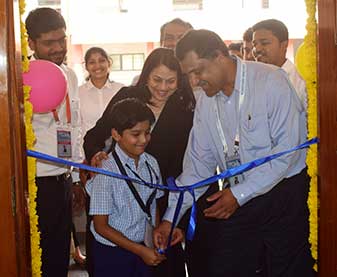
Augmented & Virtual Reality Lab, a Centre for building interactive & immersive experiences was inaugurated at Sahyadri in the presence of Padmashri Ananth Agarwal, CEO of edX, MIT,USA, Dr. Anuradha Agarwal, Principal Research Scientist at MIT, USA, Mr. Manjunath Bhandary, Chairman, Bhandary Foundation, Mr. Johnson Tellis, Founder, DREAMERS. Mr. Sachin Ganesh, Founder, DreamSoft Innovations, shared the vision & goal of the lab. AR & VR lab will be utilized by students & faculty to create interactive games, educational videos & experiences.
Mechanical Student excels in the art of Music
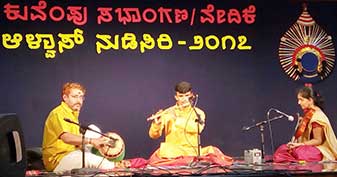
Abhishek M B, student of second year Mechanical Engineering has won 1st prize in Instrumental Solo (Non-Percussion) held at Karavali Yuva Utsava-2017 organized by Dakshina Kannada District Karavali Utsava Committee. He has also performed in Alvas Nudisiri 2017. He has been awarded Suvasini Hegde & T R Krishnan Young Talent Award-2017 by Sangeetha Parishath Mangaluru on the occasion of Mangaluru Sangeethotsava-2017. All these are his recent achievements.
|
|
|
|
|